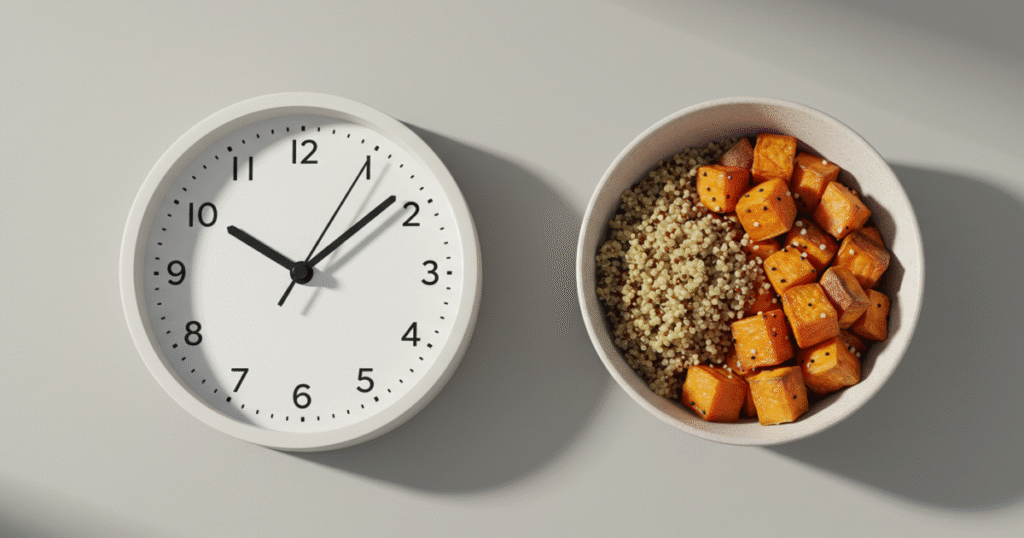The idea that eating carbohydrates after 6 PM will instantly derail your weight loss progress is one of the most persistent myths in the fitness world. It’s a rule that’s been passed down without much question, creating a sense of fear and guilt around enjoying a perfectly normal part of your dinner. But what does the science actually say? Is it really a bad idea to eat carbs at night if your goal is to lose weight?
The short answer is no. The idea that your body has a “carb curfew” is a fundamental misunderstanding of how your metabolism works. For successful and sustainable weight loss, the most critical factor isn’t when you eat your carbs, but your total calorie intake over a 24-hour period (1). Let’s break down this concept through the lens of the Pillar Methodology and treat your body like what it is: a laboratory, not a battlefield.
The Nourish Pillar: Your Body Runs on Energy, Not a Clock
According to the Nourish pillar, our primary goal is to supply our bodies with the high-quality materials they need to function optimally. Carbohydrates are the body’s preferred source of fuel. When you eat them, they are broken down into glucose, which is used for immediate energy or stored as glycogen in your muscles and liver for later use.
The fear around nighttime carbs is based on the assumption that because you’re less active in the evening, your body won’t use this energy, and it will be immediately stored as fat. However, your body is constantly using energy, even when you’re sleeping. It’s performing essential regenerative processes like repairing muscle tissue, consolidating memories, and carrying out cellular functions. These all require energy.
The truth is, your body doesn’t just shut down its fat-burning processes at night. A recent study published in the European Journal of Nutrition found that as long as total daily calories and macronutrients were matched (2), the timing of carbohydrate intake had no significant impact on body composition. Weight loss or gain is ultimately determined by your overall energy balance—if you consume fewer calories than you expend, you will lose weight, regardless of when those calories were eaten.
The Audit Pillar: Run the Experiment and Analyze Your Data
This is where the Audit pillar becomes your most powerful tool. Instead of blindly following a rigid rule like “no carbs at night,” we encourage you to run an experiment. Your body is your laboratory, and you are the lead researcher.
Here’s how you can form a hypothesis and test it:
- The Hypothesis: “If I include a moderate portion of complex carbohydrates (like sweet potatoes, brown rice, or quinoa) with my dinner, I will have more consistent energy levels, better sleep quality, and still be able to lose weight.”
- The Experiment: For two weeks, continue to follow your weight loss plan, but instead of avoiding carbs at night, mindfully include a controlled portion with your evening meal.
- Analyze the Data: At the end of the two weeks, perform an Audit. How did you feel? Did you sleep better? Were your workouts fueled? Most importantly, how did it impact your weight loss progress?
For many people, a serving of carbohydrates in the evening can actually improve sleep quality by aiding in the production of serotonin and melatonin. Better sleep is a critical component of the Regenerate pillar and is directly linked to better appetite control and fat loss.
The Verdict: Focus on Quality and Quantity, Not the Clock
The myth that carbs at night are bad for weight loss is just that—a myth. It oversimplifies the complex process of metabolism and creates unnecessary dietary restrictions that can make your plan harder to stick to.
From the perspective of the Pillar Methodology, the key is to focus on the big picture:
- Nourish: Ensure you are in a slight calorie deficit and getting your carbohydrates from whole, unprocessed sources.
- Audit: Pay attention to your own biofeedback. Run personal experiments to see what works best for your body and your lifestyle.
So, go ahead and enjoy that serving of brown rice with your dinner. As long as it fits within your total daily calorie and macronutrient goals, it will not prevent you from reaching your weight loss goals. Ditch the food guilt and embrace the freedom that comes with understanding the science.
